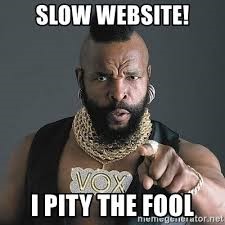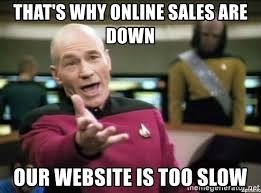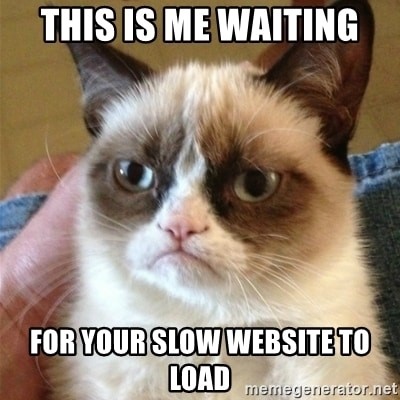The Impact of Slow Website Speed on SEO, SEM and Adwords
Slow website speed is never a good thing. It can have a negative impact on your site’s branding, sales and revenue as well as its reputation. But strangely enough, slow website speed can actually have an effect on SEO (Search Engine Optimization), SEM (Search Engine Marketing) and Adwords. Since 2010, Google has made adjustments to its search and ranking algorithm to include page loading speed. Meaning, it’s not enough to have a site that supports SEO, promoted by SEM and is subscribed to Adwords. Site pages need to be loaded within one second or less, in optimal connection conditions to be higher up in the search results. This measure is applicable to territories with known high internet speeds.

This is still for your own sake as much as Google’s, despite Google making money out of Adwords and SEM paid listings. They themselves will miss out on paid-per-clicks should your site fall out of rank due to slow website speed. Google apparently wants your business to do well and make the internet a lot faster by getting all businesses to optimize their code and beef up their infrastructure.
Google even performed a little introspection and learned that by slowing down their search engine, there was less engagement from users. Easily traceable given its billions of users. The slower the search results, fewer clicks. Fewer clicks, the fewer websites visited and fewer websites mean less pay-per-click. Going down the grapevine, this applies to slow website speed as well. If the website loads slowly, their ads load slowly as well. It’s bad enough the ads are largely ignored and/or blocked.
Therefore, Google needs to penalize slower websites.
“Our experiments demonstrate that slowing down the search results page by 100 to 400 milliseconds has a measurable impact on the number of searches per user of -0.2% to -0.6% (averaged over four or six weeks depending on the experiment). That’s 0.2% to 0.6% fewer searches for changes under half a second!… When we slow our own users down [on Google.com], we see less engagement… “Users love fast sites. A faster web is a good thing all around… We want to return faster sites, but not at the expense of relevance.”
— Amit Singhal, Google Executive
Google has several ways to measure website speed. Primarily, they use their site-visiting robot, Googlebot and by measuring site load time with Google Toolbar. Again, because of this measure, slow website speed can have a negative impact on SEO. Whatever benefits your website can have with better SEO will be slightly negated if your site loads too slowly.
How about SEM?
It’s the same with SEO. Actually SEO is part of Search Engine Marketing or SEM. Companies who have yet to beef up their infrastructure, or find a way to optimize their code without sacrificing security, will have to compensate by investing a little more on search engine marketing. Companies will have to pay more to consultants to beef up the site’s SEO and to increase paid advertising. If they don’t want a prolonged SEM campaign, website optimization should be the company’s primary concern, at least every few years. This should be everybody’s concern if they plan to earn from having a website.

SEM covers more than infusing the website content with keywords, ads and paid inclusion and would therefore be the best way to compensate Google’s penalty on slow website speed.
Become visible in search results
- Website popularity. – This is an analysis of how popular the site is on the web, based on how many of the site’s pages appear in search results as well as the number of backlinks to the site.
- Keyword research. – This involves researching the correct combinations of keywords needed for maximum engagement and giving the website the appropriate content. The content should contain and answer the primary questions about the website’s product. Who, what, where, how and when.
- The use of back-end tools. – Analytics tools and traffic counters allow marketers to analyze the correct combinations of keywords that the site should propagate.
- Mobile-friendly Website Checker from Google. – Most people check websites on mobile devices. So many people get turned off not only by slow websites, but by unfriendly mobile designs. While many website creating tools offer mobile website previews, it’s still best done through trial and error. Or tools like Google’s Mobile-friendly Website Checker to check if the site actually fits mobile-use standards.
- And of course, the best way to immediately become visible in search results are the combination of the right keywords and paid inclusion. The site comes up on top of search results with an ‘ad’ tag, which is then followed by a generic looking result below them.
Improving your site
So the way slow websites can really impact SEM is to make search engine marketing companies focus a little more on actually improving the client’s website. A good SEM company should include website optimization services apart from keyword injections on various parts and content, and by promoting the site through backlinks, social media and outright paying Google. To look into the website code, how to make it faster, how to make it more mobile-friendly. To look better on mobile as well as on desktops.
There’s a big opportunity as internet speed and bandwidth will only improve. As the web moves faster, viewer patience unfortunately grows thinner. People expect their screens to instantly change as fast as anyone changes the channel on TV. In fact, that slow refreshing channel info at the bottom of the screen while watching cable is starting to annoy.

